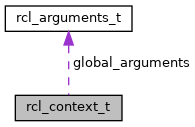Encapsulates the non-global state of an init/shutdown cycle. More...
#include <context.h>

Public Member Functions | |
| RCL_ALIGNAS (8) uint8_t instance_id_storage[RCL_CONTEXT_ATOMIC_INSTANCE_ID_STORAGE_SIZE] | |
| Private storage for instance ID atomic. More... | |
Public Attributes | |
| rcl_arguments_t | global_arguments |
| Global arguments for all nodes which share this context. More... | |
| struct rcl_context_impl_t * | impl |
| Implementation specific pointer. | |
Detailed Description
Encapsulates the non-global state of an init/shutdown cycle.
The context is used in the creation of top level entities like nodes and guard conditions, as well as to shutdown a specific instance of init.
Here is a diagram of a typical context's lifecycle:
A declared but not defined rcl_context_t instance is considered to be "uninitialized", and passing an uninitialized context to any functions will result in undefined behavior. Some functions, like rcl_init() require the context instance to be zero initialized (all members set to "zero" state) before use.
Zero initialization of an rcl_context_t should be done with rcl_get_zero_initialized_context(), which ensures the context is in a safe state for initialization with rcl_init().
Initialization of an rcl_context_t should be done with rcl_init(), after which the context is considered both initialized and valid. After initialization it can be used in the creation of other entities like nodes and guard conditions.
At any time the context can be invalidated by calling rcl_shutdown() on the rcl_context_t, after which the context is still initialized but now invalid.
Invalidation indicates to other entities that the context was shutdown, but is still accessible for use during cleanup of themselves.
After being invalidated, and after all of the entities which used it have been finalized, the context should be finalized with rcl_context_fini().
Finalizing the context while entities which have copies of it have not yet been finalized is undefined behavior. Therefore, the context's lifetime (between calls to rcl_init() and rcl_context_fini()) should exceed the lifetime of all entities which use it directly (e.g. nodes and guard conditions) or indirectly (e.g. subscriptions and topics).
Member Function Documentation
◆ RCL_ALIGNAS()
| rcl_context_t::RCL_ALIGNAS | ( | 8 | ) |
Private storage for instance ID atomic.
Accessing the instance id should be done using the function rcl_context_get_instance_id() because the instance id's type is an atomic and needs to be accessed properly to ensure safety.
The instance id should not be changed manually - doing so is undefined behavior.
The instance id cannot be protected within the impl pointer's type because it needs to be accessible even when the context is zero initialized and therefore impl is NULL. Specifically, storing the instance id in the impl would introduce a race condition between accessing it and finalizing the context. Additionally, C11 atomics (i.e. "stdatomic.h") cannot be used directly here in the case that this header is included into a C++ program. See this paper for an effort to make this possible in the future: http://www.open-std.org/jtc1/sc22/wg21/docs/papers/2018/p0943r1.html
Member Data Documentation
◆ global_arguments
| rcl_arguments_t rcl_context_t::global_arguments |
Global arguments for all nodes which share this context.
Typically generated by the parsing of argc/argv in rcl_init().
The documentation for this struct was generated from the following file:
- include/rcl/context.h
 1.8.17
1.8.17